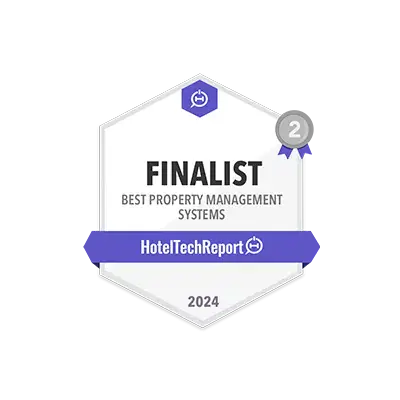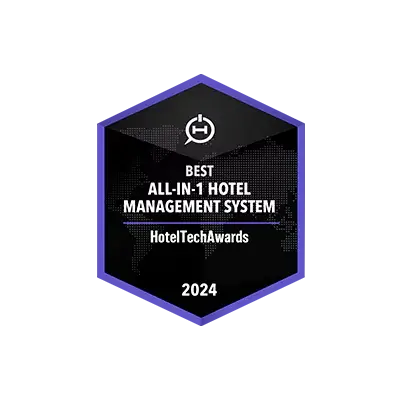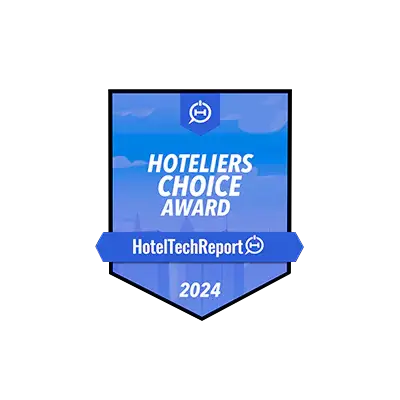
By Cloudbeds
A hotel’s website is the foundation of a strong online presence and provides hoteliers with a platform to showcase their property, build trust with potential guests, and encourage direct bookings. A well-developed digital marketing strategy can help hoteliers increase their website’s visibility to reach more travelers at the right time in their research process.
Read on for some easy (and free!) ways for hoteliers to boost their website’s search engine ranking to generate more clicks, page views, and hotel bookings.
Why online visibility is important for all hospitality properties
There are thousands of hotels worldwide vying for travelers’ attention online. To stand online, hoteliers need to establish a strong online presence to attract potential customers and convince them to book rooms.
An optimized hotel website gives properties the ability to expand their distribution strategy across multiple channels to drive more direct bookings and reduce their reliance on online travel agencies (OTAs). In today’s market, OTAs dominate online hotel searches due to their enormous budgets (Booking.com spent over $3.8 billion on marketing in 2021 alone!), making it hard for independent properties to compete.
A strong digital presence can help hotels build brand awareness to increase direct traffic to their site and direct booking rates. As a hotelier, the key is to be consistent in your hotel marketing efforts and start small with simple but effective strategies.
Can independent hoteliers improve their website’s performance without advanced SEO?
Many independent hoteliers ask themselves — can I improve my website’s performance without advanced SEO?
The short answer is, yes! There are tons of simple ways for hoteliers to improve the performance of their website without having to learn complicated search engine optimization (SEO) practices.
Start by ensuring your website design is user-friendly and optimized for mobile devices. Over 53% of total web visits in 2022 were on smartphones, making it a critical component of a well-performing site.
Next, ensure your website’s content is relevant, engaging, and includes keywords you want to target. Google crawls your content before recommending it to travelers to ensure it applies to the indicated search term.
After building a website with a good user experience and high-quality content that aligns with your keyword strategy, make sure you have the tools to convert website traffic. A booking engine can help streamline the booking process for website visitors and significantly increase your conversion rates. Add calls-to-action to ‘book now’ on your home page and throughout your site to encourage visitors to book.
For optimal efficiency, your booking engine should be integrated with your property management system (PMS), so you can send confirmation emails and pre-stay communications to build trust and loyalty with guests.
A user-friendly website, strong keyword strategy, and high-quality content are great starting points for your hotel website. Once you have these in place, consider adding the following four additional channels to help boost your hotel website’s performance.
4 easy ways to instantly boost your hotel website’s visibility
1. Claim your Google Business Profile (and continually optimize it!)
What is it?
A Google Business Profile is a FREE profile offered by Google that is displayed across popular travel search results, including Google Search, Google Hotel Search, and Google Maps, to help travelers discover properties.
Hoteliers can manage how their property is displayed on search results by claiming their profile and optimizing it with the correct information. To maximize the benefits of your profile, ensure that you:
- Select accurate and relevant categories
- Use high-quality images and refresh them on a seasonal basis to help travelers better visualize their stay
- Generate reviews (and respond to both positive and negative ones)
- Create an FAQ section
- Include important keywords and search phrases
Why it’s important?
Kent Schnepp, a digital marketer with over 20 years of internet marketing experience, hosted Cloudbeds’ Ask a Digital Marketer Webinar and pointed out that “a property’s Google Business Profile is even more important than its website. Not only is it an extension of your website and brand, but it makes it a lot easier to rank within your local business listings and organic search results.”
With over 8.5 billion daily searches, being visible on Google should be a top priority for hoteliers across the hospitality industry.
2. Ensure NAP consistency
What is it?
NAP stands for name, address, and phone number. These three attributes must be consistent online across all websites where your property’s information is mentioned. Kent says, “the biggest piece that I see for organic search rankings is that your name, address, and phone number is exactly the same across every single data aggregator and source that Google utilizes.”
While it can be challenging to ensure consistency across all sources, start by listing all of the places you know your property’s information exists, including:
- Local listings
- Social media profiles (LinkedIn, Facebook, Instagram)
- Review sites
- Google Business Profile
From here, confirm that the NAP information is consistent. If you make any changes to your contact information, refer to this list and update your data accordingly.
Why it’s important?
Search engines scan websites like Yelp, YellowPages, TripAdvisor, and more to confirm that your name, address, and phone number are consistent across sources. If even the slightest discrepancy exists, your website will lose credibility points which will negatively impact its organic rankings. Ranking high in organic search results is crucial for increasing your hotel website’s visibility across search engines like Google and Bing.
3. Develop a review strategy
What is it?
A review strategy is an ongoing effort implemented by hotel management to collect online reviews from guests on sites like Google and TripAdvisor. Potential guests use online reviews in the research process before booking a hotel room, so hoteliers must generate a steady flow of reviews to remain relevant online. Research shows that 68% of consumers will leave a review if asked; therefore, it’s up to hotels to figure out the best time to ask guests for reviews.
As part of your strategy, consider adding a few guest touchpoints mid-stay and post-stay to understand guest sentiment. A mid-stay check-in can help you identify any areas that require service recovery to stop a bad review before it happens and increase the likelihood of a five-star review. After a guest has checked out, send a post-stay survey to gather feedback and share a link to the review site of your choice.
Kent says that “the two review spots that matter in terms of effort and payoff are TripAdvisor and Google Reviews,” and hoteliers should focus their strategy on building reviews on these sites.
Why it’s important?
81% of travelers frequently or always read reviews before booking a hotel. While reviews build trust and encourage travelers to book, they also play an essential role in SEO. Search engines consider the number, quality, and age of reviews in their organic search results. Therefore, hoteliers must ensure that they are consistently collecting new, high-scoring reviews to support optimal website visibility and performance.
4. Improve citations and ask for backlinks
What is it?
Citations and backlinks are hyperlinks on other websites that link back to your hotel’s website. They show search engines that your website has high-quality content worth showing in organic search results.
One of the best ways to increase citations and backlinks is to reach out to your local tourism or travel associations to inquire about partnership opportunities and benefits. Kent says that “associations are often already ranking high for your search terms and can be leveraged to link back to your website to build domain authority.”
Websites with domain authority have a high search engine ranking score and are seen as credible resources. Getting a backlink from a website with a strong domain authority will increase your authority as well.
For additional backlinks, consider incorporating public relations into your hotel marketing strategy by:
- Reaching out to local publications that have written about your property in the past and asking for a link
- Creating high-quality content on your website that people want to share. Consider writing blogs on top things to do in your area and share them on social media to be picked up and featured on other websites.
- Providing special offers for different traveler segments and sharing these offers online. For example, if you’re a family-friendly property, create a special offer where kids get free breakfast and share the link with parenting websites or other relevant publications for the chance to be featured (with a backlink!).
Why it’s important?
Backlinks and citations result in credibility across search engines, boosting your hotel’s website to the top of search engine results. Getting backlinks and citations can take time and requires relationship building, however, they are extremely valuable and a worthwhile investment. Remember, quality trumps quantity when it comes to backlinks, so be intentional with your strategy.
Stand out among the crowd
While it may seem impossible to compete alongside all of the properties online today, all it takes is a bit of time and the right tactics. Simple yet effective strategies like the ones mentioned here can help increase your property’s website visibility through high organic search rankings. Ensure your hotel’s website is optimized to support this increased traffic with a user-friendly interface, high-quality content, and a fully-integrated booking engine to help drive more direct bookings.



















